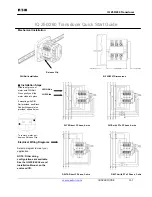
Alignmen
clearly pinpointed and any faulty components
replaced, and the need for realignment deter
mined to be absolutely necessary.
The following test equipment (and thorough
familiarity with its correct U:se) is necessary for
complete realignment. Correction of problems
caused by misalignment resulting from use of
improper test equipment is not covered under
the warranty policy. While most steps do not
require all of the equipment listed, the interac
tions of some adjustments may require that more
complex adjustments be performed afterwards.
Do not attempt to perform only a single step
unless it is clearly isolated electrically from all
other steps. Have all test equipment ready before
beginning, and follow all of the steps in a section
in the order presented.
Required Test Equipment
D
RF Signal Generator with calibrated output
level at 200 MHz
D
Deviation Meter (linear detector)
D
AF Millivoltmeter
D
SINAD Meter
D
Inline Wattmeter with 5% accuracy at 200
MHz
D
Regulated DC Power Supply: adjustable from
1 0 to 17 VDC, 15A
D
50-Q RF Dummy Load: lOOW at 200 MHz
D
Frequency Counter:± 0.1 ppm accuracy at 200
MHz
D
AF Signal Generator
D
DC Voltmeter: high impedance
D
VHF Sampling Coupler
D
AF Dummy Load: 8 Q, SW
Alignment Preparation
&
Precautions
A 50-Q dummy load and inline wattmeter
must be connected to the main antenna jack in all
procedures that call for transmission, except
where specified otherwise. Correct alignment is
not possible with an antenna.
After completing one step, read the following
step to determine whether the same test equip
ment will be required. If not, remove the test
equipment (except dummy load and wattmeter,
if connected) before proceeding.
Correct alignment requires that the ambient
temperature be the same as that of the transceiver
and test equipment, and that this temperature be
held constant between 20° and 30° C (68° - 86 °F).
When the transceiver is brought into the shop
from hot or cold air it should be allowed some
time for thermal equalization with the environ
ment before alignment.
If possible, alignments should be made with
oscillator shields and circuit boards firmly af
fixed in place. Also, the test equipment must be
thoroughly warmed up before beginning.
Note:
Signal levels in dB referred to in this proce
dure are based on 0 dBµ= 0.5 µV(closed circuit).
PLL
&
Transmitter
Set up the test equipment as shown for trans
mitter alignment. Maintain the supply voltage at
13.8V DC for all steps.
PLL & Transmitter Alignment Setup
50-ohm
Dummy Load
Freq. Counter
Deviation Meter
AF Millivoltmeter
PLL VCV (Varactor Control Voltage)
Regulated
13.SV PSU
AF Millivoltmeter
D
Connect the positive lead of the DC voltmeter
to the test point VCV on the Main Unit, as
indicated in the figure, and the negative lead
to chassis ground.
2-6
FT-2500M Technical Supplement
















































